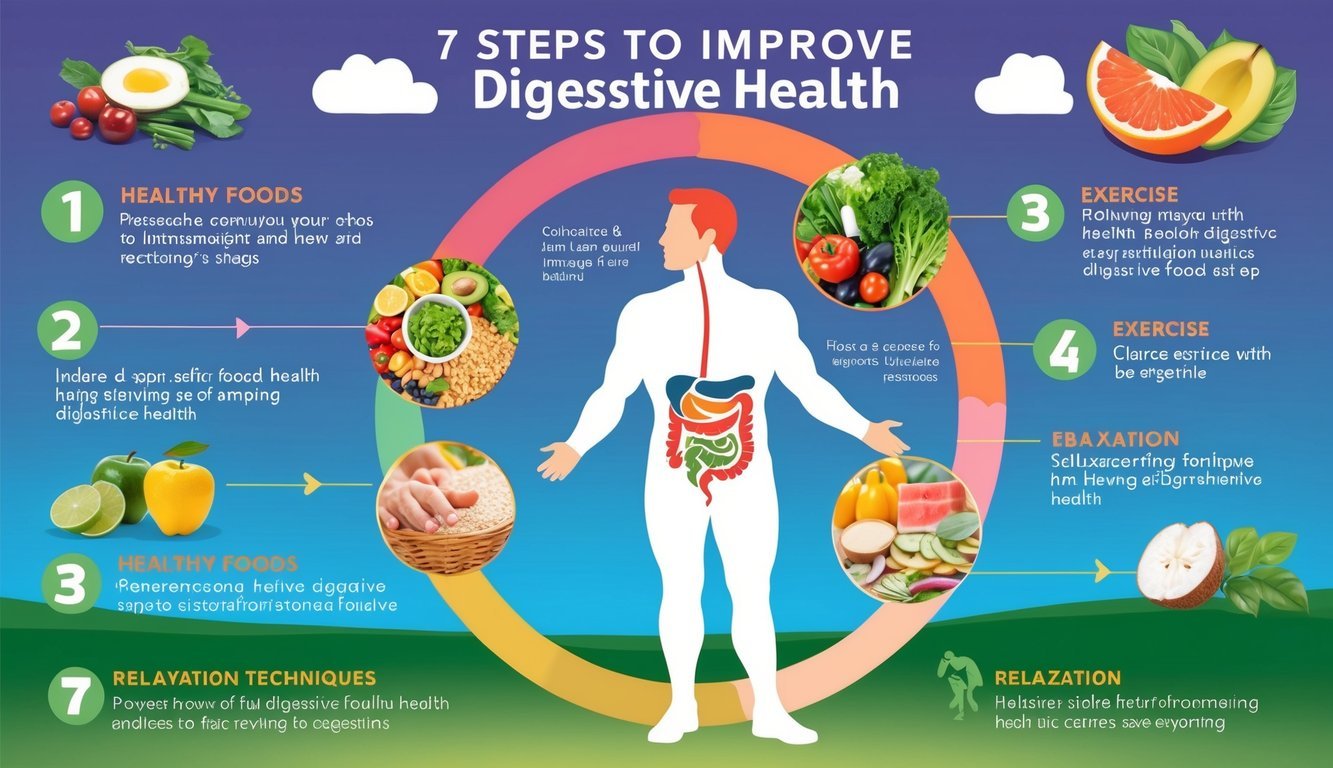Digestive health is something I care about deeply.
Many of us experience discomfort or irregularity at some point, and it can really affect our daily lives. I found I could significantly improve my digestive regularity and comfort by making simple changes to my habits.

Taking control of my gut health doesn’t have to be daunting.
It’s all about understanding which small steps can lead to noticeable improvements, making my digestion work smoother and feeling better overall.
Eat yogurt daily
I’ve found that eating yogurt daily really boosts my digestive health.
Yogurt contains probiotics, which are the good bacteria that help balance my gut microbiome.
This balance is important for digestion and can make my body feel more comfortable.
When I choose yogurt, I often go for those with live cultures.
They support gut health and improve nutrient absorption.
Plus, yogurt is a great source of calcium and protein.
I’ve noticed that incorporating yogurt into my breakfast or snacks keeps me feeling full.
It’s low in calories, especially Greek yogurt, making it a smart choice for weight management too.
Regular consumption of yogurt has been linked to improved digestion and even a reduction in digestive issues.
It’s a simple, tasty way to take care of my gut and overall well-being.
So, whether I add it to smoothies or enjoy it with fruit, yogurt has become a staple in my daily routine.
2) Include oats in breakfast
I love starting my day with oats.
They’re not only versatile but also really beneficial for digestive health.
Oats are high in fiber, which can help keep things moving in my digestive system.
When I prepare oats, I usually opt for rolled or steel-cut varieties.
They take a bit longer to cook but are worth the wait.
I can add fruits, nuts, or seeds to up the nutritional value.
For instance, bananas or berries work perfectly to boost fiber even more.
I sometimes make overnight oats for a quick breakfast.
Just mix oats with yogurt or milk and let them soak overnight.
In the morning, I add my favorite toppings, making it a delicious and convenient option.
Additionally, oatmeal can aid in keeping me full.
This helps prevent mid-morning snacking, which can unsettle my stomach.
The balance of fiber and nutrients keeps my digestive system happy.
Including oats in my breakfast routine has made a noticeable difference in how I feel throughout the day.
It’s a simple yet effective step for improving digestive regularity and comfort.
3) Stay hydrated
Staying hydrated is crucial for keeping my digestive system running smoothly.
When I drink enough water, it helps move food through my intestines efficiently.
Dehydration can lead to constipation, which I’ve experienced before.
I find that drinking enough water makes a noticeable difference.
It softens my stool and makes everything flow better.
I aim for about eight glasses a day, but this can vary.
If I’m active or it’s hot outside, I increase my intake.
I also enjoy herbal teas and water-rich foods like fruits and vegetables.
Carrying a water bottle with me keeps hydration top of mind.
It’s a simple way to remind myself to drink throughout the day.
If I notice any signs of sluggish digestion, I make sure to check my water intake.
Staying hydrated is one of the easiest, most effective strategies I’ve found for improving my digestive regularity and comfort.
4) Get regular exercise

I find that regular exercise is key to improving digestive health.
It enhances blood flow to the digestive tract, which is essential for optimal function.
I enjoy activities like brisk walking, yoga, or even light stretching.
These help stimulate my digestive system and keep things moving smoothly.
Yoga poses, such as twists and forward bends, are particularly effective.
They massage the internal organs and promote better circulation.
I try to get at least 20-30 minutes of physical activity each day.
Whether it’s a quick walk or a session on the yoga mat, I notice a difference in my comfort levels.
Even gentle movements can make a big impact.
Just a few stretches or a short walk immediately after meals can aid digestion.
Incorporating exercise into my routine has truly made a difference in my digestive regularity.
It’s a simple yet effective step to feel better overall.
5) Reduce stress levels

I’ve found that stress can really mess with my digestion.
When I’m anxious or overwhelmed, I often experience bloating and discomfort.
It’s surprising how much my mental state can affect my gut health.
One thing that helps me is regular exercise.
Whether I’m walking, practicing yoga, or swimming, moving my body seems to ease tension and improve digestion.
I also make it a point to incorporate stress-reduction techniques into my routine.
Deep breathing exercises and meditation have been game-changers for calming my mind.
Spending time in nature works wonders, too.
I’ve noticed that even small moments of mindfulness throughout the day can make a difference.
These practices help me keep my stress levels in check and promote a happier gut.
Finding what specifically lowers my stress has been key.
It’s all about making time for myself and engaging in activities that bring me joy.
6) Try fennel tea

I find fennel tea to be a great option for improving digestive comfort.
This fragrant brew has natural properties that can soothe my digestive system, especially after a heavy meal.
Fennel is known for helping with bloating and gas, which makes it a go-to drink for many.
I appreciate that it contains antioxidants, like vitamin C, which support overall health.
Making fennel tea is easy.
I simply steep fennel seeds in hot water or brew pre-packaged tea bags.
The soothing aroma and mild licorice flavor make it quite enjoyable.
Drinking fennel tea in the morning can kickstart my digestion for the day.
I’ve noticed that it helps create a more comfortable gut environment.
Next time I’m feeling a bit off, I’ll definitely reach for a cup of fennel tea.
It’s a simple and pleasant way to support my digestive health.
7) Chew food thoroughly

Chewing my food thoroughly has made a noticeable difference in my digestion.
It seems simple, but taking the time to do it right is essential.
When I chew more, I break down food into smaller pieces, making it easier for my digestive system to process.
Studies indicate that chewing each bite 30 to 50 times can improve nutrient absorption.
The more I chew, the better my body can access the vitamins and minerals in my meals.
I also find that slower eating leads to better portion control.
By putting my utensils down between bites, I give myself time to chew and enjoy my food.
This practice helps me feel satisfied with less.
Plus, thorough chewing can prevent uncomfortable digestive issues like bloating and heartburn.
I’ve noticed that when I rush through meals, I often end up feeling sluggish afterward.
Focusing on my chewing helps me avoid that.
Incorporating this simple habit into my routine has truly enhanced my digestive regularity and comfort.
Understanding Digestive Health

Digestive health is crucial for overall well-being.
It involves various factors like diet, gut bacteria, and lifestyle choices that can significantly impact my body’s functions.
The Role of the Gut Microbiome
I often think of my gut microbiome as a bustling city of bacteria.
This community plays a vital role in digestion, nutrient absorption, and even my immune response.
The gut naturally hosts trillions of microorganisms, including beneficial ones.
These good bacteria help break down complex carbohydrates and synthesize essential vitamins.
When the balance tips, it can lead to discomfort and health issues.
To support my gut microbiome, I focus on a diverse diet rich in fiber.
Foods like fruits, vegetables, and whole grains serve as fuel for these beneficial bacteria.
Probiotic-rich foods such as yogurt and fermented options like kimchi also contribute positively.
Common Causes of Digestive Discomfort
I’ve learned that several factors can derail my digestive comfort.
Stress is a significant player.
When I’m stressed, my body releases hormones that can disrupt digestion.
Diet is another major contributor.
Overeating, consuming too many processed foods, and not getting enough fiber can lead to bloating and constipation.
Some common symptoms of digestive discomfort include heartburn, gas, and abdominal pain.
It’s crucial for me to listen to my body and identify any triggers that may compromise my digestive health.
Simple changes, like reducing meal sizes and eating slowly, can help.
Keeping a food diary might shed light on certain patterns that affect my digestion.
Lifestyle Changes for Better Digestion

I’ve found that making simple lifestyle changes can significantly enhance digestive health.
Focusing on proper hydration and mindful eating habits has made a noticeable difference for me.
Here’s why these components are so essential.
Drinking enough water helps break down food more efficiently, making it easier for the body to absorb nutrients.
Additionally, incorporating simple diet changes for digestion, such as eating more fiber-rich foods and avoiding excessive processed sugars, can promote gut health and prevent discomfort.
These small adjustments have greatly improved my overall well-being and energy levels.
Importance of Proper Hydration
Staying hydrated is crucial for smooth digestion.
Water plays a vital role in breaking down food, enabling nutrients to be more easily absorbed.
Plus, it helps prevent constipation, a common issue for many.
I aim for at least eight glasses of water daily.
An easy way to keep track is to carry a reusable water bottle.
If plain water gets boring, I’ll add slices of lemon or cucumber for a refreshing twist.
Hydration also helps maintain the balance of good bacteria in the gut, further supporting my overall digestive health.
Remember, dehydration can quickly lead to discomfort, so drink up!
Mindful Eating Habits
Mindful eating has been another game-changer for me.
It’s not just about what I eat but how I eat.
Taking time to enjoy my meals helps me listen to my body’s hunger and fullness cues.
I aim to eat without distractions like TV or smartphones.
This way, I can better appreciate the flavors and textures of my food, making each meal satisfying.
Additionally, chewing food thoroughly is vital.
It aids digestion and allows my stomach to process food more efficiently.
I also find that eating smaller, more frequent meals helps maintain consistent energy levels and reduces bloating.
Keeping a food diary can also help track what works best for me.

